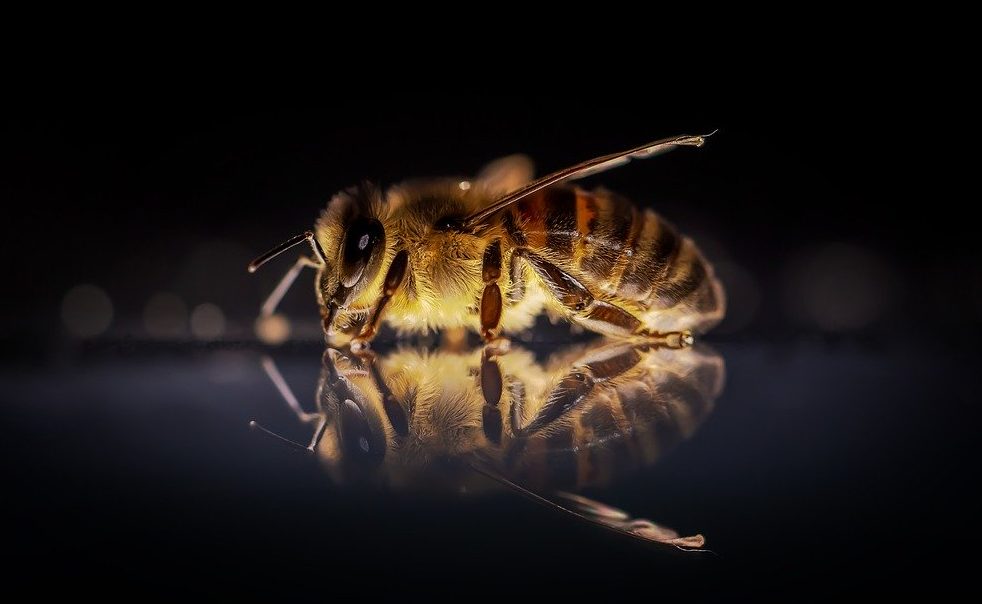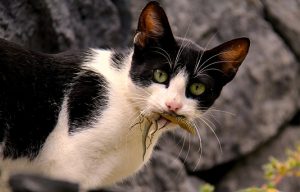Can cats eat bees? What about wasps or hornets? The truth is cats will eat anything whether or not they realize that doing so could hurt them. I’ve seen cats eat all sorts of things that us humans think are disgusting such as spiders, centipedes, and ants just to name a few.
In this article, we find out if cats can eat bees in a safe manner or if we should be quick to react when we see our feline companions messing around with these mean little bugs.
Table of Contents
What If My Cat Ate a Bee?
Eating bugs, as gross as we think it is, is quite natural for your cat to do. This also includes bugs with stingers such as bees, wasps, and hornets.
If your cat ate a bee, chances are pretty good that they will be just fine. This is especially true if your cat wasn’t stung as a result of eating a bee.
However, if your cat starts acting sick or injured, it’s a good idea to bring them into a veterinarian as soon as you possibly can just to be on the safe side. You just never know if your cat will have an allergic reaction to eating a bee.
Are Bees Dangerous to Cats?
As stated above, if your cat simply eats a bee, then they will normally be just fine. Eating is one thing. Getting stung by a bee carries with it a whole different set of potential problems.
If your cat gets stung in the mouth or throat, then the sting could cause swelling, fever, vomiting, and can even make it hard for your cat to breathe. So if your cat starts exhibiting these symptoms after eating a bee or getting stung by one, then you need to get your cat to the vet as fast as possible.
If your cat has a habit of chasing around bees, you should do everything you can to curb this bad habit. If you have a problem with bees where you live, I recommend using an ultrasonic bug repeller. These inexpensive gadgets keep all sorts of critters away, but more importantly, they won’t hurt your cat.
How to Treat a Bee Sting on Your Cat
If your cat was not stung inside of its mouth, but was instead stung somewhere else on their body, you should be able to treat your cat’s sting at home.
Once you’ve found the site of the bee sting, try to see if you can locate the stinger. When you do find it, do NOT use tweezers. This will only secrete more venom out of the stinger. Instead, use a credit card and swipe the skin to try to flick it off.
Now that you’ve hopefully removed the stinger, the next thing to do is treat the sting with an ice pack to reduce the swelling. Don’t put the ice pack directly on your cat. Wrap it in a light towel first.
It’s important to note that your cat may try to scratch at the sting area. Try to prevent them from doing so, or the wound could become infected. Also, be sure that your cat is eating and drinking as it normally does. If you notice any dramatic changes in their appetite, this could be a sign that your cat is feeling ill from the bee.
Can Cats Eat Wasps or Hornets?
Generally speaking, wasps and hornets present the same risks to your cat as bees do. The difference being that hornets and wasps do not usually leave their stingers in your cat after stinging it.
So if your cat gets stung by a wasp or a hornet, you don’t have to look for a stinger before you treat the sting. Just reduce the swelling and keep them from scratching the wound like you normally would with a bee sting.
Final Thoughts
So can cats eat bees? Yes, your cat can eat a bee, but why risk it? They could get stung in the mouth and this could cause serious health problems. Your best bet is to just keep your cat indoors to avoid the possibility of getting stung in the first place.




